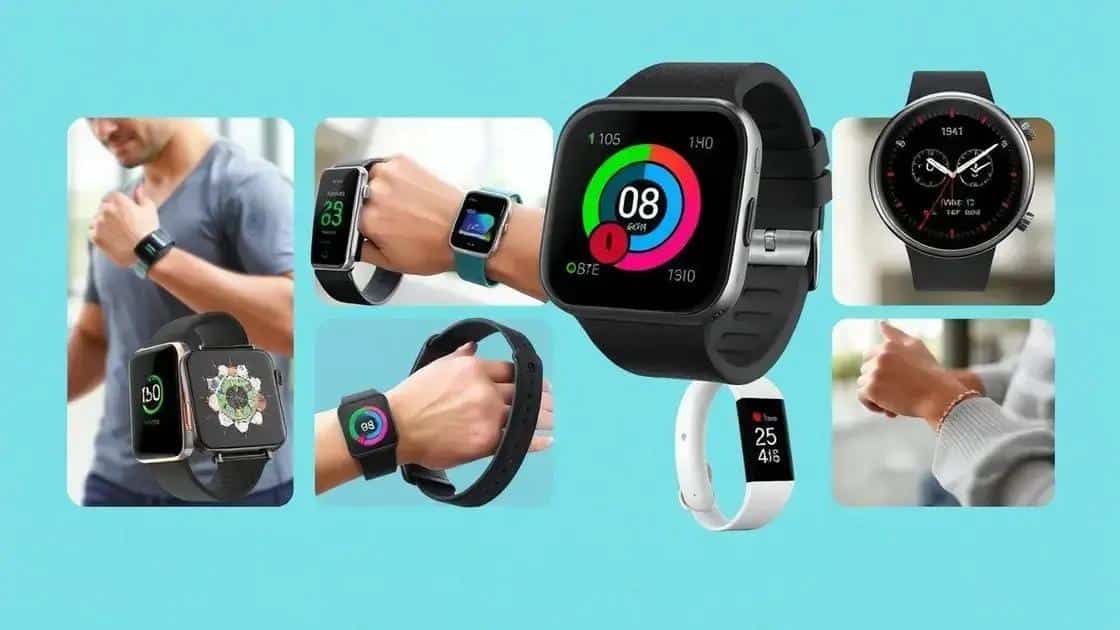What’s new in health tech advancements that you should see

Wearable health devices use advanced technology to monitor health metrics like heart rate and sleep patterns, enhancing personal health management through real-time feedback and data integration.
What’s new in health tech advancements? This question is at the forefront of our rapidly changing world. With technology reshaping how we approach health care, it’s essential to keep up with innovations that are making a difference.
Key technological breakthroughs in health care
Health care is experiencing rapid innovation, driven by key technological breakthroughs that transform the way we provide and receive care. From advanced diagnostic tools to cutting-edge treatments, technology plays a vital role in improving patient outcomes and efficiency.
Artificial Intelligence in Health Care
Artificial intelligence is revolutionizing diagnostic processes. AI algorithms analyze medical images, which enhances accuracy in detecting diseases like cancer at earlier stages. These tools help doctors make better decisions faster, ultimately saving lives.
The Rise of Telemedicine
Telemedicine allows patients to consult health care providers from the comfort of their homes. This breakthrough has made access to care easier, especially for those living in remote areas. Patients can avoid long travel times and waitlists, making their experience more convenient.
- Increased access to specialists
- Lower cost of healthcare delivery
- Enhanced patient satisfaction
Moreover, the integration of data analytics is enhancing personalized medicine. By collecting vast amounts of patient data, health care providers can tailor treatments to individual needs. This level of customization leads to more effective therapies and better patient engagement.
Wearable Health Devices
Wearable technology such as fitness trackers and smartwatches is also a boon for health care. These devices monitor vital signs and physical activity, promoting proactive health management. They empower individuals to take charge of their health and alert them to potential issues.
- Real-time health monitoring
- Encouragement of healthy habits
- Early detection of health problems
As we continue to embrace technological advances, the future of health care looks promising. Breakthroughs in technology not only improve the quality of care but also pave the way for innovations we have yet to imagine.
How telemedicine is evolving patient care

Telemedicine is greatly changing how we think about patient care. With advancements in technology, more patients are accessing health services through virtual appointments. This transformation is making health care more accessible and efficient.
Convenience of Virtual Appointments
One of the biggest benefits of telemedicine is convenience. Patients no longer need to travel long distances to see their doctors. Instead, they can connect from their homes using their phones or computers. This is especially helpful for those living in rural areas.
Improved Patient Engagement
Through telemedicine, patients can have better access to their health information. They can easily review their medical histories and treatment plans during virtual visits. This leads to more engaged and informed patients who are active participants in their own care.
- Enhanced communication with providers
- Quick access to specialists
- Ability to ask questions in real-time
Furthermore, telemedicine is breaking down barriers for those who face challenges in traditional settings. It helps individuals with mobility issues or those who fear visiting hospitals. By offering flexible scheduling, telemedicine caters to busy lifestyles, allowing patients to fit appointments into their daily routines.
Cost-Effectiveness of Telehealth
Using telehealth services can also reduce costs. Patients save money on transportation and time off work. Health systems can lower overhead costs associated with in-person visits. This helps make health care more affordable for everyone.
- Lower transportation costs
- Fewer missed appointments
- Reduced health care expenses
As we see more advancements in telemedicine, the future of patient care looks bright. Innovative technologies will continue to enhance accessibility, effectiveness, and the overall patient experience.
The role of AI in diagnostics and treatment
The rise of artificial intelligence (AI) is dramatically changing the landscape of diagnostics and treatment in health care. With its ability to analyze vast amounts of data, AI is assisting health care professionals in making faster and more accurate decisions.
AI in Diagnostic Processes
AI technologies can process medical images, such as X-rays and MRIs, more quickly than human eyes. By recognizing patterns, AI can help diagnose diseases like cancer or heart conditions at earlier stages. This early detection is crucial for the success of treatments, offering patients a better chance of recovery.
Enhancing Treatment Plans
Additionally, AI can analyze medical histories and identify the most effective treatment plans for individual patients. Using data from a variety of sources, it can suggest personalized medications and therapies based on a patient’s unique profile. This approach not only improves outcomes but also enhances the overall experience for patients.
- Ability to tailor treatments
- Improved accuracy in dosing medications
- Reduction of trial and error in prescriptions
AI-driven chatbots are also making waves in patient interaction. These chatbots provide immediate assistance and answer common medical questions, saving time for both patients and health care providers. This technology allows for better communication and frees up valuable resources.
Predictive Analytics in Health Care
Moreover, AI employs predictive analytics to forecast health trends and potential outbreaks. By examining data patterns, health organizations can prepare responses and allocate resources more effectively. This proactive approach enhances public health measures and improves community well-being.
- Early warning systems for disease outbreaks
- Optimization of resource distribution
- Enhanced disease prevention strategies
As AI continues to evolve, its role in diagnostics and treatment will only grow, providing innovative solutions that enhance patient care and health outcomes.
Emerging trends in wearable health devices

Wearable health devices are at the forefront of a health tech revolution, significantly changing how we monitor our health. These devices range from fitness trackers to smartwatches, offering features that help people stay informed about their well-being.
Key Features of Wearable Health Devices
Many wearable devices now come equipped with advanced sensors. These sensors track crucial health metrics such as heart rate, sleep patterns, and even blood oxygen levels. This information is invaluable for users who want to understand their health better.
- Real-time heart rate monitoring
- Sleep quality analysis
- Step and activity tracking
In addition to tracking physical activity, wearables can alert users to potential health issues. For instance, some devices can notify users if their heart rate exceeds a safe level or if they experience irregular heartbeats. Such features empower individuals to take proactive steps regarding their health.
Integration with Health Apps
Many wearables connect seamlessly with health apps on smartphones. This integration allows users to view their health data in one place. Through these apps, users can set fitness goals, receive personalized recommendations, and gain insights into their daily habits.
- Goal setting for exercise routines
- Nutrition tracking and suggestions
- Social sharing for motivation
Moreover, the trend towards continuous health monitoring is growing. Users can now receive alerts about their conditions without stepping into a doctor’s office. For example, wearables can monitor chronic conditions like diabetes by tracking glucose levels throughout the day. This capability helps patients manage their health more effectively.
The Future of Wearable Health Technology
As technology advances, we can expect even more innovation in wearable health devices. Future devices may integrate artificial intelligence to provide more personalized health insights. Additionally, new sensors may emerge, capable of monitoring even more complex metrics.
Overall, wearable health devices are paving the way for a healthier future by making health monitoring accessible and engaging.
As wearable health devices continue to evolve, they play an essential role in monitoring and improving our health. These devices empower users by providing real-time insights and personalized data. From tracking fitness to alerting users about potential health issues, they enhance how we take care of ourselves. Together with artificial intelligence and seamless app integrations, the future of health monitoring looks bright and promising. With ongoing advancements, we can expect more effective and engaging ways to manage our health, making it more accessible for everyone.
FAQ – Frequently Asked Questions about Wearable Health Devices
What are wearable health devices?
Wearable health devices are gadgets like fitness trackers and smartwatches that monitor various health metrics such as heart rate, sleep patterns, and physical activity.
How do wearable devices help with health monitoring?
These devices provide real-time feedback on health metrics, alert users to potential health issues, and promote better lifestyle choices.
Can wearables integrate with smartphones?
Yes, most wearable health devices can connect to smartphones, allowing users to view and analyze their health data through dedicated apps.
Are wearable health devices suitable for everyone?
Yes, wearable health devices can benefit a wide range of people, from fitness enthusiasts to those managing chronic conditions, by providing valuable insights into their health.





